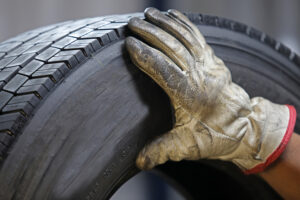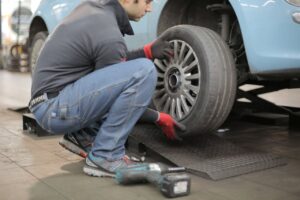How Long Do Tyres Last & What Affects The Longevity?
Tyres are one of, if not the most important safety features on your vehicle and they need looking after and regular maintenance to ensure the best performance on the roads whilst providing the highest level of safety. The question of “how long do your tyres last” is not an easy question to answer, but in this blog post we are going to be going through everything that can contribute to your tyre longevity.
So how long do tyres last?
There are many contributing factors that play into the lifespan of your tyres. How many miles you drive, how you drive, where the vehicle is parked, road conditions and how often you carry out tyre maintenance.
For example, hard cornering, hard braking, incorrect tyre pressure and misaligned wheels can cause your tyre to wear unevenly, and therefore shorten the tyres lifespan significantly. Tyres can also deteriorate over time, especially when left to stand for long periods of time exposed to UV light.
The general consensus among tyre safety experts, your tyres will need changing every 20,000 miles or between 5-6 years depending on your driving habits and maintenance routines. However, the legal limit to a tread depth is 1.6mm, many manufacturers and garages recommend refitting your tyres at a 3mm tread depth no matter if you’ve had them less than the idealised 5-6 years. If you drive front wheel drive however, your front wheels will always wear out more quickly, and the same if you drive rear wheel drive, your back tyres will wear out faster.
Of course premium tyres are designed to last longer than budget tyres, but the overall performance of the premium tyre is vastly improved.
Driving style
The way you drive holds a huge impact on the life span of your tyres. Drivers who accelerate quickly from a standstill can wear out the tyres faster than those who accelerate slowly. Taking corners too quickly can also put pressure on your tyres and therefore reduce longevity. Turning too fast puts extra pressure on the edges of your tyres and the hard braking will cause flat spotting as the tyre’s contact area will endure more friction against the road.
Tyre compounds
Tyre manufacturers across the world are forever trying to develop new tyre compounds to increase the life of a tyre, with safety and the environment being a key factor that plays into this development.
For example, summer tyres have softer compounds that have been specially designed to perform in higher temperatures. The soft compound tends to wear out faster, however when the temperatures drop below freezing, the compound is no longer effective and significantly reduces the tyres grip on the road.
Winter tyres however have a harder compound that has been designed to perform well in freezing temperatures including snow and ice. Winter tyre compound means it lasts longer, but can wear out quickly when used in normal conditions.
All season tyres have a softer compound than winter tyres but it is firmer than the standard summer tyre. This combined compound makes all season tyres a good choice if you dont want to switch your tyres from season to season. They will wear out quicker than winter tyres but last longer than most summer models.
Tyre Age
Tyres naturally deteriorate with age, especially when left to stand in UV light so a garage is always a good place to keep your car when you are not driving it as this will prolong your tyres life. On the flip side of this, leaving your vehicle in storage too long will damage the integrity of your tyre and reduce longevity.
For more information or to purchase your new tyres, head over to our website here.




